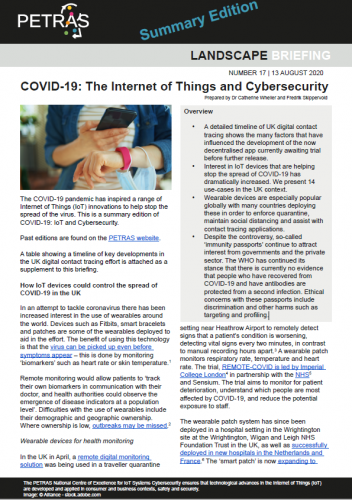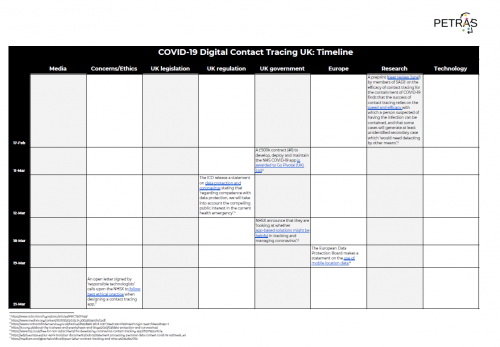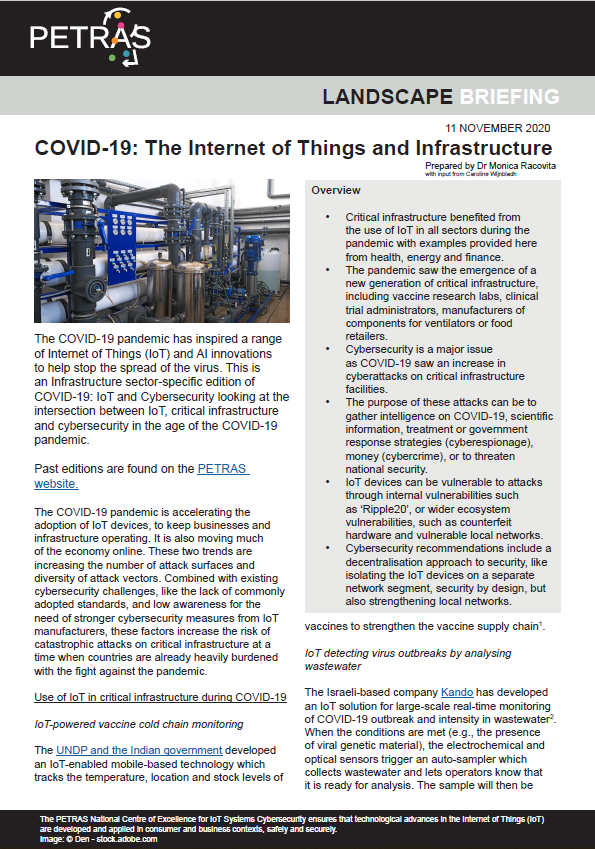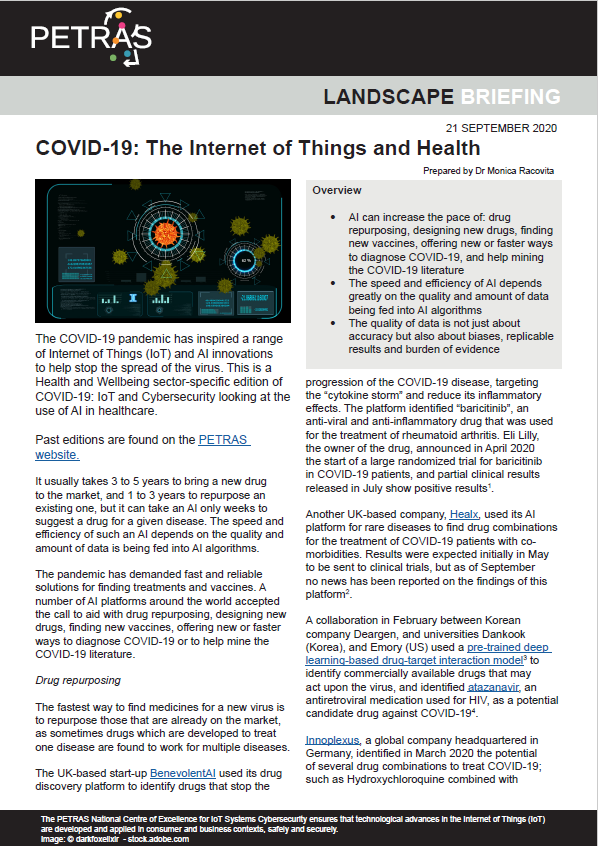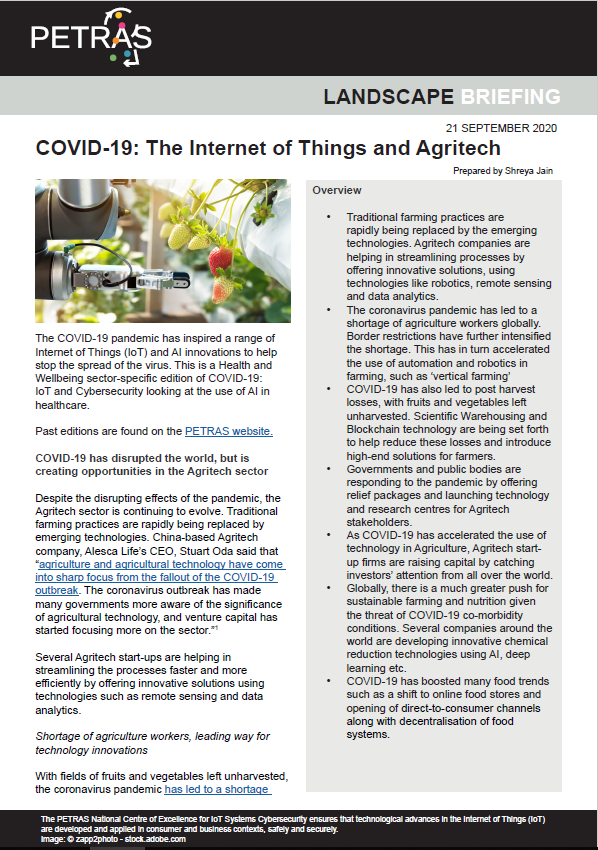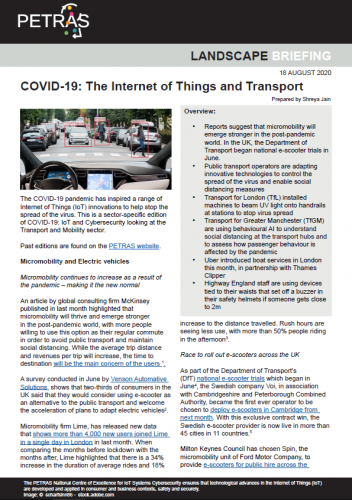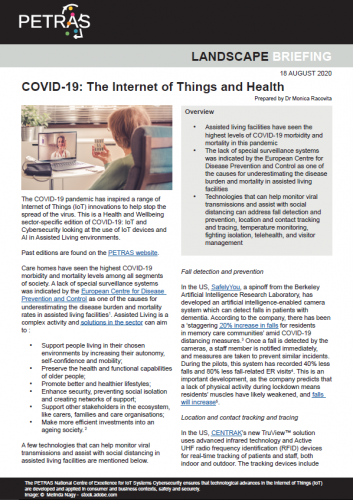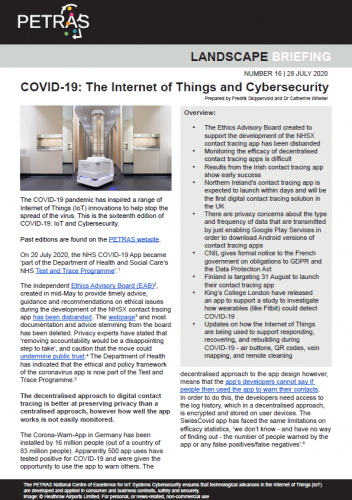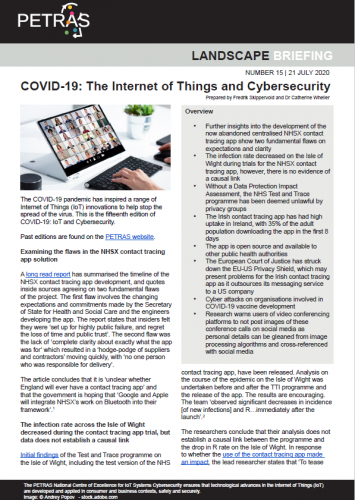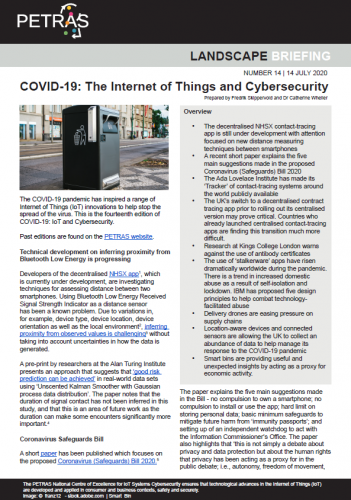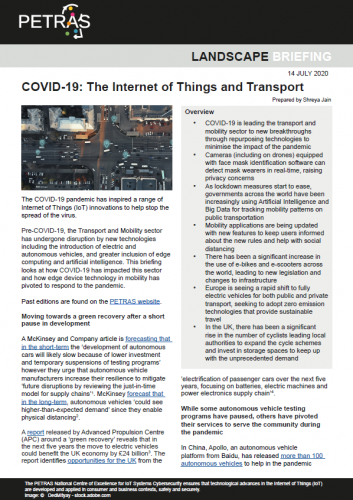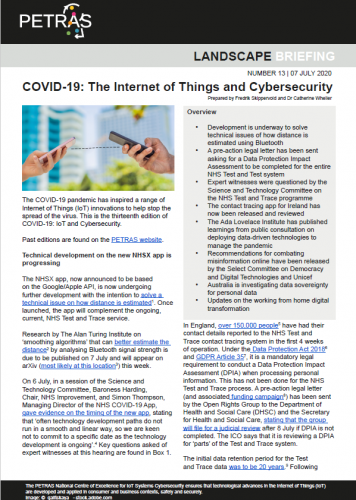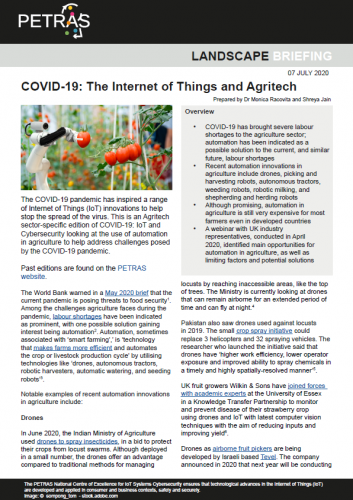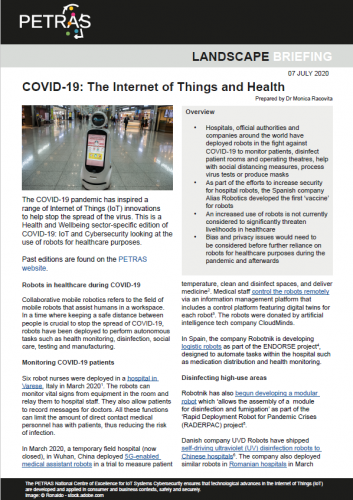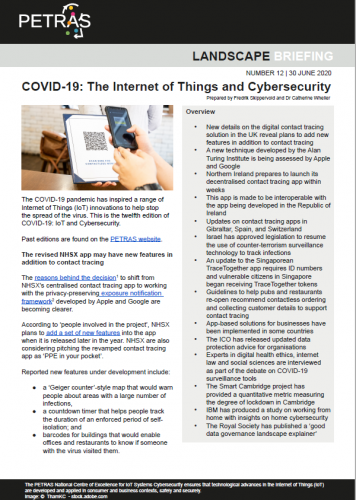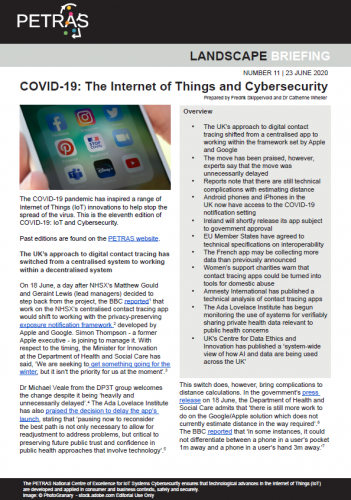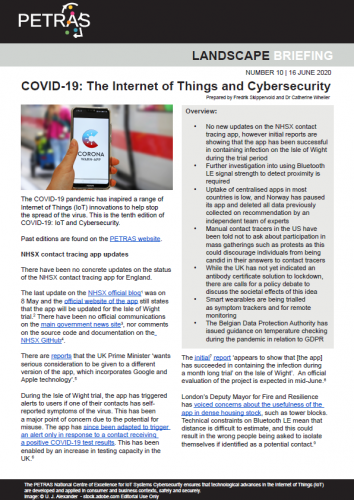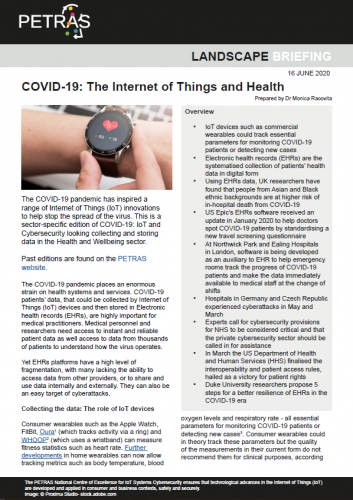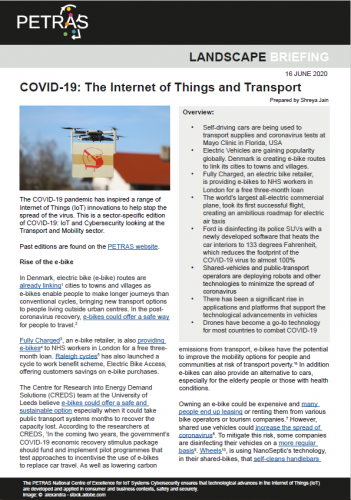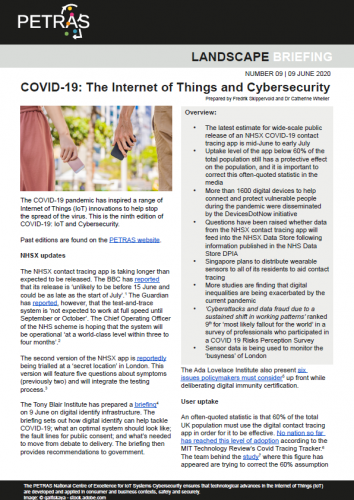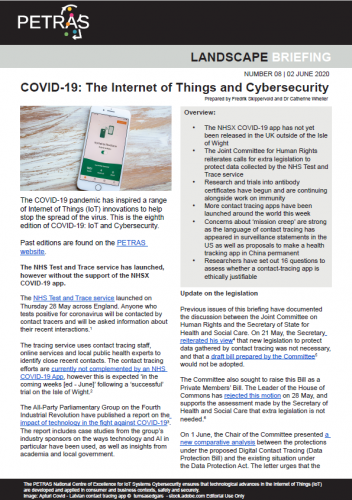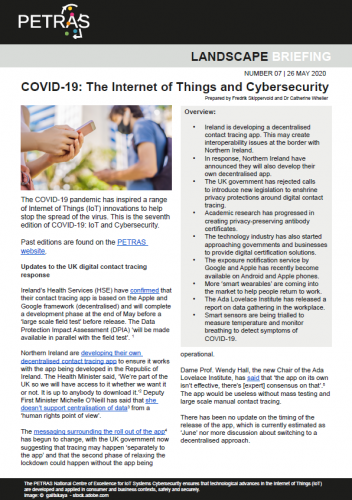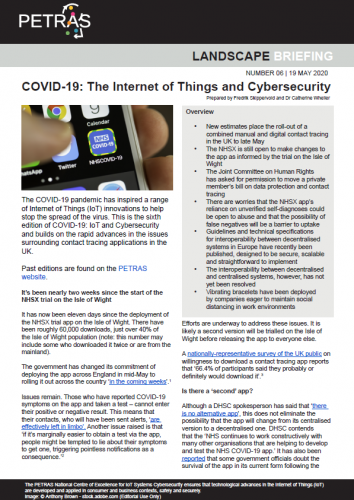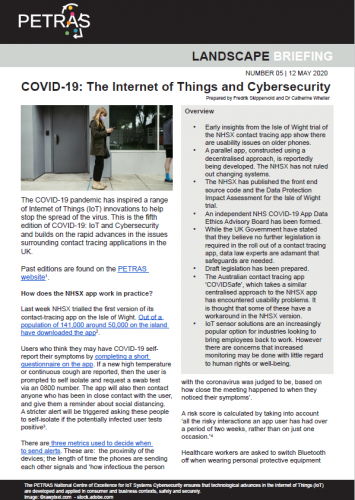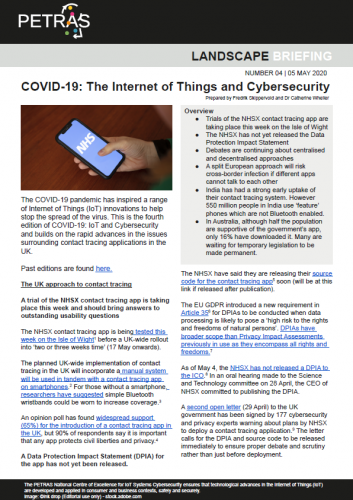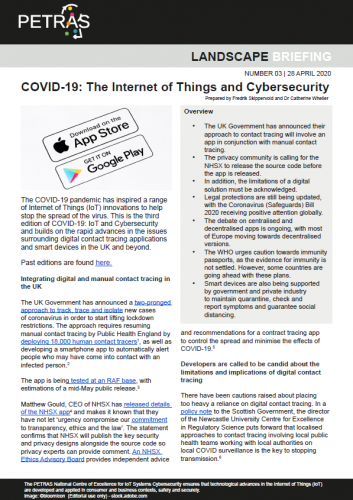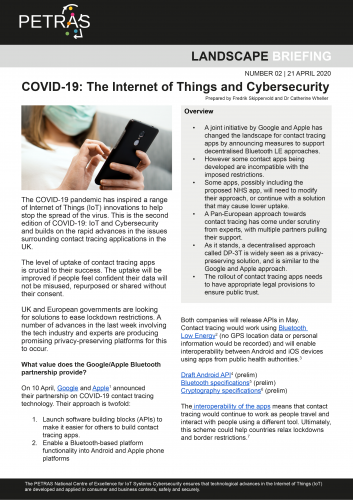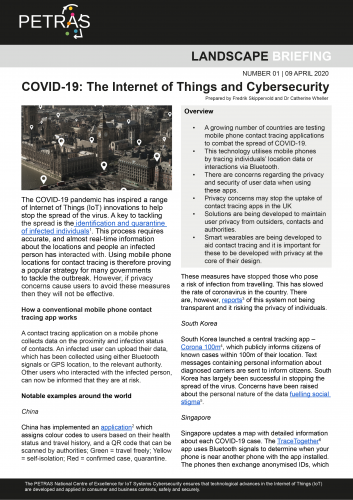Article, News
COVID-19: The Internet of Things and Cybersecurity
The PETRAS COVID-19 Landscape Briefings summarise the latest news on IoT related topics, providing a concise and easy to digest overview of developments.
We are currently producing briefings covering the following topics:
- Contact tracing app developments around the globe
- Smart device innovation and data collected through sensors
- Sector specific briefings, such as transport, health and agritech
Issue 17: Summary Edition
The COVID-19 pandemic has inspired a range of Internet of Things (IoT) innovations to help stop the spread of the virus. This is a SUMMARY EDITION of COVID-19: IoT and Cybersecurity.
Download the short briefing [13 August 2020, PDF, 1MB]
Download the timeline of UK digital contact tracing [updated 13 August 2020, PDF, 405KB]
Download the latest sector specific landscape briefings:
- COVID-19: The Internet of Things and Supply Chains [18 December 2020, PDF]
- COVID-19: The Internet of Things and Critical Infrastructure [11 November 2020, PDF]
- COVID-19: The Internet of Things and Health (AI) [21 September 2020, PDF]
- COVID-19: The Internet of Things and Agritech [21 September 2020, PDF]
- COVID-19: The Internet of Things and Health (Assisted Living) [18 August 2020, PDF]
- COVID-19: The Internet of Things and Transport [18 August 2020, PDF]
- COVID-19: The Internet of Things and Transport [14 July 2020, PDF]
- COVID-19: The Internet of Things and Health (Robots) [07 July 2020, PDF]
- COVID-19: The Internet of Things and Agritech (Robots) [07 July 2020, PDF]
- COVID-19: The Internet of Things and Health [16 June 2020, PDF, 443KB]
- COVID-19: The Internet of Things and Transport [16 June 2020, PDF]
Overview
• A detailed timeline of UK digital contact tracing shows the many factors that have influenced the development of the now decentralised app currently awaiting trial before further release.
• Interest in IoT devices that are helping stop the spread of COVID-19 has dramatically increased. We present 14 use-cases in the UK context.
• Wearable devices are especially popular globally with many countries deploying these in order to enforce quarantine, maintain social distancing and assist with
contact tracing applications.
• Despite the controversy, so-called ‘immunity passports’ continue to attract interest from governments and the private sector. The WHO has continued its stance that there is currently no evidence that people who have recovered from COVID-19 and have antibodies are protected from a second infection. Ethical concerns with these passports include discrimination and other harms such as targeting and profiling.
Issue 16, 28 July 2020
The COVID-19 pandemic has inspired a range of Internet of Things (IoT) innovations to help stop the spread of the virus. This is the sixteenth edition of COVID-19: IoT and Cybersecurity.
Download the short briefing (28 July 2020, PDF, 420 KB)
Overview
• The Ethics Advisory Board created to support the development of the NHSX contact tracing app has been disbanded
• Monitoring the efficacy of decentralised contact tracing apps is difficult
• Results from the Irish contact tracing app show early success
• Northern Ireland’s contact tracing app is expected to launch within days and will be
the first digital contact tracing solution in the UK
• There are privacy concerns about the type and frequency of data that are transmitted
by just enabling Google Play Services in order to download Android versions of contact tracing apps
• CNIL gives formal notice to the French government on obligations to GDPR and the Data Protection Act
• Finland is targeting 31 August to launch their contact tracing app
• King’s College London have released an app to support a study to investigate how wearables (like Fitbit) could detect COVID-19
• Updates on how the Internet of Things are being used to support responding, recovering, and rebuilding during COVID-19 – air buttons, QR codes, vein mapping, and remote cleaning
Issue 15, 21 July 2020
The COVID-19 pandemic has inspired a range of Internet of Things (IoT) innovations to help stop the spread of the virus. This is the fifteenth edition of COVID-19: IoT and Cybersecurity.
Download the short briefing (21 July 2020, PDF, 466 KB)
Overview
• Further insights into the development of the now abandoned centralised NHSX contact tracing app show two fundamental flaws on expectations and clarity
• The infection rate decreased on the Isle of Wight during trials for the NHSX contact tracing app, however, there is no evidence of a causal link
• Without a Data Protection Impact Assessment, the NHS Test and Trace programme has been deemed unlawful by privacy groups
• The Irish contact tracing app has had high uptake in Ireland, with 35% of the adult population downloading the app in the first 8 days
• The app is open source and available to other public health authorities
• The European Court of Justice has struck down the EU-US Privacy Shield, which may present problems for the Irish contact tracing app as it outsources its messaging service to a US company
• Cyber attacks on organisations involved in COVID-19 vaccine development
• Research warns users of video conferencing platforms to not post images of these conference calls on social media as personal details can be gleaned from image processing algorithms
Issue 14, 14 July 2020
The COVID-19 pandemic has inspired a range of Internet of Things (IoT) innovations to help stop the spread of the virus. This is the fourteenth edition of COVID-19: IoT and Cybersecurity.
Download the short briefing (14 July 2020, PDF, 524 KB)
Overview
• The decentralised NHSX contact-tracing app is still under development with attention focused on new distance measuring techniques between smartphones
• A recent short paper explains the five main suggestions made in the proposed Coronavirus (Safeguards) Bill 2020
• The Ada Lovelace Institute has made its ‘Tracker’ of contact-tracing systems around the world publicly available
• The UK’s switch to a decentralised contract tracing app prior to rolling out its centralised version may prove critical. Countries who already launched centralised contact-tracing apps are finding this transition much more difficult.
• Research at Kings College London warns against the use of antibody certificates
• The use of ‘stalkerware’ apps have risen dramatically worldwide during the pandemic. There is a trend in increased domestic abuse as a result of self-isolation and lockdown. IBM has proposed five design principles to help combat technology-facilitated abuse
• Delivery drones are easing pressure on supply chains
• Location-aware devices and connected sensors are allowing the UK to collect an abundance of data to help manage its response to the COVID-19 pandemic
• Smart bins are providing useful and unexpected insights by acting as a proxy for economic activity.
Issue 13, 07 July 2020
The COVID-19 pandemic has inspired a range of Internet of Things (IoT) innovations to help stop the spread of the virus. This is the thirteenth edition of COVID-19: IoT and Cybersecurity.
Download the short briefing (07 July 2020, PDF, 412 KB)
Overview
• Development is underway to solve technical issues of how distance is estimated using Bluetooth
• A pre-action legal letter has been sent asking for a Data Protection Impact Assessment to be completed for the entire NHS Test and Test system
• Expert witnesses were questioned by the Science and Technology Committee on the NHS Test and Trace programme
• The contact tracing app for Ireland has now been released and reviewed
• The Ada Lovelace Institute has published learnings from public consultation on
deploying data-driven technologies to manage the pandemic
• Recommendations for combating misinformation online have been released by the Select Committee on Democracy and Digital Technologies and Unicef
• Australia is investigating data sovereignty for personal data
• Updates on the working from home digital transformation
Issue 12, 30 June 2020
The COVID-19 pandemic has inspired a range of Internet of Things (IoT) innovations to help stop the spread of the virus. This is the twelfth edition of COVID-19: IoT and Cybersecurity.
Download the short briefing (30 June 2020, PDF, 546 KB)
Overview
• New details on the digital contact tracing solution in the UK reveal plans to add new features in addition to contact tracing
• A new technique developed by the Alan Turing Institute is being assessed by Apple and Google
• Northern Ireland prepares to launch its decentralised contact tracing app within weeks
• This app is made to be interoperable with the app being developed in the Republic of Ireland
• Updates on contact tracing apps in Gibraltar, Spain, and Switzerland
• Israel has approved legislation to resume the use of counter-terrorism surveillance technology to track infections
• An update to the Singaporean TraceTogether app requires ID numbers and vulnerable citizens in Singapore began receiving TraceTogether tokens
• Guidelines to help pubs and restaurants re-open recommend contactless ordering and collecting customer details to support contact tracing
• App-based solutions for businesses have been implemented in some countries
• The ICO has released updated data protection advice for organisations
• Experts in digital health ethics, internet law and social sciences are interviewed as part of the debate on COVID-19 surveillance tools
• The Smart Cambridge project has provided a quantitative metric measuring the degree of lockdown in Cambridge
• IBM has produced a study on working from home with insights on home cybersecurity
• The Royal Society has published a ‘good data governance landscape explainer’
Issue 11, 23 June 2020
The COVID-19 pandemic has inspired a range of Internet of Things (IoT) innovations to help stop the spread of the virus. This is the eleventh edition of COVID-19: IoT and Cybersecurity.
Download the short briefing (23 June 2020, PDF, 426KB)
Overview
• The UK’s approach to digital contact tracing shifted from a centralised app to
working within the framework set by Apple and Google
• The move has been praised, however, experts say that the move was unnecessarily delayed
• Reports note that there are still technical complications with estimating distance
• Android phones and iPhones in the UK now have access to the COVID-19
notification setting
• Ireland will shortly release its app subject to government approval
• EU Member States have agreed to technical specifications on interoperability
• The French app may be collecting more data than previously announced
• Women’s support charities warn that contact tracing apps could be turned into tools for domestic abuse
• Amnesty International has published a technical analysis of contact tracing apps
• The Ada Lovelace Institute has begun monitoring the use of systems for verifiably
sharing private health data relevant to public health concerns
• UK’s Centre for Data Ethics and Innovation has published a ‘system-wide view of how AI and data are being used across the UK’
Issue 10, 16 June 2020
The COVID-19 pandemic has inspired a range of Internet of Things (IoT) innovations to help stop the spread of the virus. This is the tenth edition of COVID-19: IoT and Cybersecurity.
Download the short briefing (16 June 2020, PDF, 414KB)
Overview
• No new updates on the NHSX contact tracing app, however initial reports are showing that the app has been successful in containing infection on the Isle of Wight during the trial period
• Further investigation into using Bluetooth LE signal strength to detect proximity is required
• Uptake of centralised apps in most countries is low, and Norway has paused its app and deleted all data previously collected on recommendation by an independent team of experts
• Manual contact tracers in the US have been told not to ask about participation in mass gatherings such as protests as this could discourage individuals from being candid in their answers to contact tracers
• While the UK has not yet indicated an antibody certificate solution to lockdown, there are calls for a policy debate to discuss the societal effects of this idea
• Smart wearables are being trialed as symptom trackers and for remote monitoring
• The Belgian Data Protection Authority has issued guidance on temperature checking
during the pandemic in relation to GDPR
Issue 9, 09 June 2020
The COVID-19 pandemic has inspired a range of Internet of Things (IoT) innovations to help stop the spread of the virus. This is the ninth edition of COVID-19: IoT and Cybersecurity.
Download the short briefing (09 June 2020, PDF, 421KB)
Overview
• The latest estimate for wide-scale public release of an NHSX COVID-19 contact tracing app is mid-June to early July
• Uptake level of the app below 60% of the total population still has a protective effect on the population, and it is important to correct this often-quoted statistic in the media
• More than 1600 digital devices to help connect and protect vulnerable people during the pandemic were disseminated by the DevicesDotNow initiative
• Questions have been raised whether data from the NHSX contact tracing app will feed into the NHSX Data Store following information published in the NHS Data Store DPIA
• Singapore plans to distribute wearable sensors to all of its residents to aid contact tracing
• More studies are finding that digital inequalities are being exacerbated by the current pandemic
• ‘Cyberattacks and data fraud due to a sustained shift in working patterns’ ranked 9th for ‘most likely fallout for the world’ in a survey of professionals who participated in a COVID 19 Risks Perception Survey
• Sensor data is being used to monitor the ‘busyness’ of London
Issue 8, 02 June 2020
The COVID-19 pandemic has inspired a range of Internet of Things (IoT) innovations to help stop the spread of the virus. This is the eighth edition of COVID-19: IoT and Cybersecurity.
Download the short briefing (02 June 2020, PDF, 579KB)
Overview
• The NHSX COVID-19 app has not yet been released in the UK outside of the Isle of Wight
• The Joint Committee for Human Rights reiterates calls for extra legislation to protect data collected by the NHS Test and Trace service
• Research and trials into antibody certificates have begun and are continuing alongside work on immunity
• More contact tracing apps have been launched around the world this week
• Concerns about ‘mission creep’ are strong as the language of contact tracing has appeared in surveillance statements in the US as well as proposals to make a health tracking app in China permanent
• Researchers have set out 16 questions to assess whether a contact-tracing app is ethically justifiable
Issue 7, 26 May 2020
The COVID-19 pandemic has inspired a range of Internet of Things (IoT) innovations to help stop the spread of the virus. This is the seventh edition of COVID-19: IoT and Cybersecurity and builds on the rapid advances in the issues surrounding contact tracing applications, digital antibody certificates and smart devices in the UK and around the world.
Download the short briefing (26 May 2020, PDF, 458KB)
Overview
• Ireland is developing a decentralised contact tracing app. This may create interoperability issues at the border with Northern Ireland.
• In response, Northern Ireland have announced they will also develop their own decentralised app.
• The UK government has rejected calls to introduce new legislation to enshrine privacy protections around digital contact tracing.
• Academic research has progressed in creating privacy-preserving antibody certificates.
• The technology industry has also started approaching governments and businesses to provide digital certification solutions.
• The exposure notification service by Google and Apple has recently become available on Android and Apple phones.
• More ‘smart wearables’ are coming into the market to help people return to work.
• The Ada Lovelace Institute has released a report on data gathering in the workplace.
• Smart sensors are being trialled to measure temperature and monitor
breathing to detect symptoms of COVID-19.
Issue 6, 19 May 2020
The COVID-19 pandemic has inspired a range of Internet of Things (IoT) innovations to help stop the spread of the virus. This is the sixth edition of COVID-19: IoT and Cybersecurity and builds on the rapid advances in the issues surrounding contact tracing applications in the UK and around the world.
Download the short briefing (19 May 2020, PDF, 468KB)
Overview
• New estimates place the roll-out of a combined manual and digital contact tracing in the UK to late May
• The NHSX is still open to make changes to the app as informed by the trial on the Isle of Wight
• The Joint Committee on Human Rights has asked for permission to move a private member’s bill on data protection and contact tracing
• There are worries that the NHSX app’s reliance on unverified self-diagnoses could be open to abuse and that the possibility of false negatives will be a barrier to uptake
• Guidelines and technical specifications for interoperability between decentralised systems in Europe have recently been published, designed to be secure, scalable and straightforward to implement
• The interoperability between decentralised and centralised systems, however, has not yet been resolved
• Vibrating bracelets have been deployed by companies eager to maintain social distancing in work environments
Issue 5, 12 May 2020
The COVID-19 pandemic has inspired a range of Internet of Things (IoT) innovations to help stop the spread of the virus. This is the fifth edition of COVID-19: IoT and Cybersecurity and builds on the rapid advances in the issues surrounding contact tracing applications in the UK and around the world.
Download the short briefing (12 May 2020, PDF, 398KB)
Overview
• Early insights from the Isle of Wight trial of the NHSX contact tracing app show there are usability issues on older phones.
• A parallel app, constructed using a decentralised approach, is reportedly being developed. The NHSX has not ruled out changing systems.
• The NHSX has published the front end source code and the Data Protection Impact Assessment for the Isle of Wight trial.
• An independent NHS COVID-19 App Data Ethics Advisory Board has been formed.
• While the UK Government have stated that they believe no further legislation is required in the roll out of a contact tracing app, data law experts are adamant that safeguards are needed.
• Draft legislation has been prepared.
• The Australian contact tracing app ‘COVIDSafe’, which takes a similar centralised approach to the NHSX app has encountered usability problems. It is thought that some of these have a workaround in the NHSX version.
• IoT sensor solutions are an increasingly popular option for industries looking to bring employees back to work. However there are concerns that increased monitoring may be done with little regard to human rights or well-being.
Issue 4, 05 May 2020
The COVID-19 pandemic has inspired a range of Internet of Things (IoT) innovations to help stop the spread of the virus. This is the fourth edition of COVID-19: IoT and Cybersecurity and builds on the rapid advances in the issues surrounding contact tracing applications in the UK and around the world.
Download the short briefing (05 May 2020, PDF, 416KB)
Overview
• Trials of the NHSX contact tracing app are taking place this week on the Isle of Wight
• The NHSX has not yet released the Data Protection Impact Statement
• Debates are continuing about centralised and decentralised approaches
• A split European approach will risk cross-border infection if different apps cannot talk to each other
• India has had a strong early uptake of their contact tracing system. However 550 million people in India use ‘feature’ phones which are not Bluetooth enabled.
• In Australia, although half the population are supportive of the government’s app, only 16% have downloaded it. Many are waiting for temporary legislation to be made permanent.
Issue 3, 28 April 2020
The COVID-19 pandemic has inspired a range of Internet of Things (IoT) innovations to help stop the spread of the virus. This is the third edition of COVID-19: IoT and Cybersecurity and builds on the rapid advances in the issues surrounding digital contact tracing applications and smart devices in the UK and beyond.
Download the short briefing (28 April 2020, PDF, 487KB)
Overview
• The UK Government has announced their approach to contact tracing will involve an app in conjunction with manual contact tracing.
• The privacy community is calling for the NHSX to release the source code before the app is released.
• In addition, the limitations of a digital solution must be acknowledged.
• Legal protections are still being updated, with the Coronavirus (Safeguards) Bill 2020 receiving positive attention globally.
• The debate on centralised and decentralised apps is ongoing, with most of Europe moving towards decentralised versions.
• The WHO urges caution towards immunity passports, as the evidence for immunity is not settled. However, some countries are going ahead with these plans.
• Smart devices are also being supported by government and private industry to maintain quarantine, check and report symptoms and guarantee social distancing.
Issue 2, 21 April 2020
The COVID-19 pandemic has inspired a range of Internet of Things (IoT) innovations to help stop the spread of the virus. This is the second edition of COVID-19: IoT and Cybersecurity and builds on the rapid advances in the issues surrounding contact tracing applications in the UK. The level of uptake of contact tracing apps is crucial to their success. The uptake will be improved if people feel confident their data will not be misused, repurposed or shared without their consent. UK and European governments are looking for solutions to ease lockdown restrictions. A number of advances in the last week involving the tech industry and experts are producing promising privacy-preserving platforms for this to occur.
Download the short briefing (21 April 2020, PDF, 433KB)
Overview
• A joint initiative by Google and Apple has changed the landscape for contact tracing apps by announcing measures to support decentralised Bluetooth LE approaches.
• However some contact apps being developed are incompatible with the imposed restrictions.
• Some apps, possibly including the proposed NHS app, will need to modify their approach, or continue with a solution that may cause lower uptake.
• A Pan-European approach towards contact tracing has come under scrutiny from experts, with multiple partners pulling their support.
• As it stands, a decentralised approach called DP-3T is widely seen as a privacy-preserving solution, and is similar to the Google and Apple approach.
• The rollout of contact tracing apps needs to have appropriate legal provisions to ensure public trust.
Issue 1, 9 April 2020
The COVID-19 pandemic has inspired a range of Internet of Things (IoT) innovations to help stop the spread of the virus. A key to tackling the spread is the identification and quarantine of infected individuals. This process requires accurate, and almost real-time information about the locations and people an infected person has interacted with. Using mobile phone locations for contact tracing is therefore proving a popular strategy for many governments to tackle the outbreak. However, if privacy concerns cause users to avoid these measures then they will not be effective.
Download the short briefing (9 April 2020, PDF, 603KB)
Overview
• A growing number of countries are testing mobile phone contact tracing applications to combat the spread of COVID-19.
• This technology utilises mobile phones by tracing individuals’ location data or interactions via Bluetooth.
• There are concerns regarding the privacy and security of user data when using these apps.
• Privacy concerns may stop the uptake of contact tracing apps in the UK
• Solutions are being developed to maintain user privacy from outsiders, contacts and authorities.
• Smart wearables are being developed to aid contact tracing and it is important for these to be developed with privacy at the core of their design.
The information contained in PETRAS Landscape Reviews is subject to change and may have been posted by staff, students and those associated with PETRAS acting entirely in a personal capacity. PETRAS takes no responsibility for the consequences of error or for any loss or damage suffered by users of any of the information published on any of these pages, and such information does not form any basis of a contract with readers or users of it.


